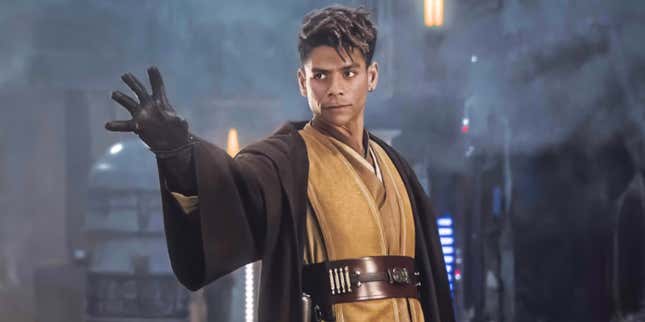A long time ago in a galaxy that’s ours, Star Wars meant fun, adventure, creativity, and cultural impact. Then Disney bought the rights from George Lucas and the franchise suffered from quality control and oversaturation (*cough* Solo, *cough* The Book of Boba Fett). When The Acolyte trailer dropped, I thought it was going to be more Disney-era Star Wars fare of meaningless drama for shells of characters. I was wrong. The Acolyte is important, raising timely questions about power delivered by one of the best ensembles ever assembled for the franchise.
Episode one opens with a sober battle between the vengeance-seeking Mae Aniseya (the “bad” twin sister, both of whom are played by Amandla Sternberg) and Jedi Master Indara (Carrie-Anne Moss of the Matrix franchise). I’m a harsh critic of action given my martial arts family background, but while there are moments that I felt lacking in martial logic (even with Newtonian-defying Jedi powers at play), there are also deftly choreographed stunts that will leave you wide-eyed, even stunned.
Spoiler alert: Mae slays Master Indara early, a move that has all the old-school, visceral power of a similarly early death on Game Of Thrones. To cast an actor as illustrious as Carrie-Anne Moss only to kill her off in the first scene of the series is not just shocking, but brave. It’s also the moment The Acolyte won me over.
“If they kill off Carrie-Anne’s character,” I thought, “they must have big plans.”
Those plans become clearer when we’re introduced to Jedi Knight Yord Fandar (Charlie Barnett), tasked with investigating Indara’s murder. The problem: Mae has an identical twin, Osha Aniseya, a Jedi dropout but who still pulses with the Force. True, the identical twins trope is a bit shticky for Star Wars, and a tad on the nose (good and bad sides of the Force, and all that), but it didn’t undermine my investment, and it won’t yours.
Oh, and hang in for Yord’s outfit. Trust me.
All of the Jedi wear gold and tan, a nod to where we are in the Star Wars timeline: These are the days of the High Republic, about a century before The Phantom Menace and the rise of Anakin Skywalker, aka Lord Vader, and before the Fall of the Jedi. The Golden Years, as it were.

This is the most progressive storytelling that has come out of the franchise since George Lucas was at the helm. The Acolyte establishes the throughline of the entire saga to follow: the corrupting nature of power and man’s eternal quest to overcome it. While it’s tempting to view these as, essentially, morality tales, The Acolyte reminds us that good versus evil is rarely a binary choice, that shades of gray live in all of us.
So who can you trust ultimately, if all of us are just a wee bit untrustworthy? Here, The Acolyte assuages those pangs of self-doubt with the introduction of Jedi Master Sol (played by the inspired Lee Jung-jae), who swallows whole every scene he’s in. As a lifelong Star Wars fan, I can say with no equivocation that Master Sol has perhaps the greatest Jedi “presence” ever felt on screen.
Lee learned English just to play the role, and the devotion to the character, Osha’s former instructor and caretaker, is evident. Each line is delivered with such intention and heart, never succumbing to mawkishness. Master Sol quickly becomes the voice of truth here, transforming this new chapter in an iconic series into the kind of character study we long for. Star Wars has always represented a glimpse at a futuristic past that reverberates with hard truths about our present: the frailties of leaders, even the most gifted of them; the immense consequences these leaders have on the generations that follow. Ultimately, though, Star Wars is a parable about the pursuit of a greater good.
The original Star Wars changed movies forever. George’s prequel trilogy made important ideas like the Force accessible for younger audiences. Carrie-Anne’s The Matrix still impacts how we look at authoritarian systems. We are in the post-Endgame era of Marvel, and arguably the Baby Yoda craze has come and gone. Disney needed a weighty, gripping adventure that could inspire something bigger than just a good review. It needed new icons. It appears to have achieved that with Master Sol. The Acolyte is the genesis of something profound.


